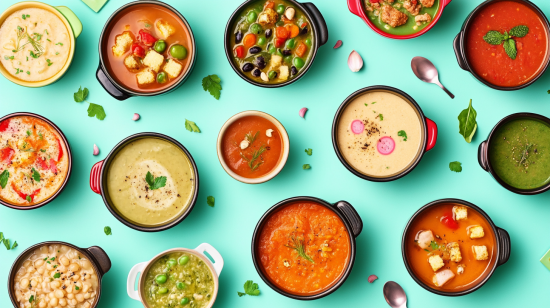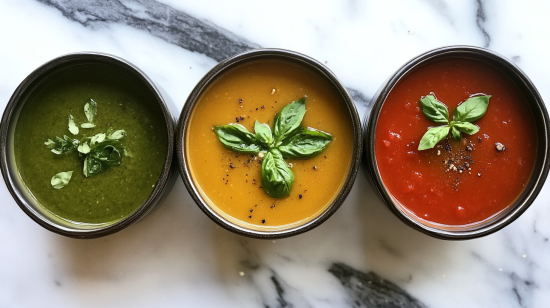Introduction
The Importance of Seasoning in Soups
What Seasoning Makes Soup Taste Better? Seasoning is the foundation of any great soup, transforming a simple blend of ingredients into a symphony of flavors. It enhances the natural taste of vegetables, meats, and broths, creating a balanced dish that pleases the palate. From the subtle touch of salt to bold spices, seasonings are essential to achieving a well-rounded soup.
Overview of Flavor Enhancement
The right seasonings don’t just add flavor—they create harmony. Whether it’s the warmth of paprika or the brightness of lemon juice, understanding what seasoning makes soup taste better ensures every spoonful is a delight.
Table of Contents
The Science Behind Seasoning
How Seasoning Works to Balance and Enhance Flavors
Seasoning enhances soup by balancing the five basic tastes:
- Salty: Enhances the natural flavors of other ingredients.
- Sweet: Counteracts bitterness and adds depth.
- Sour: Adds brightness and cuts through richness.
- Bitter: Balances sweetness and creates complexity.
- Umami: Delivers a savory, satisfying taste.
The science lies in understanding how these elements interact. A pinch of salt can amplify sweetness, while a splash of vinegar can brighten heavy broths, making the soup taste more vibrant and delicious.
Basic Seasonings for All Soups
Salt and Its Role as a Foundational Seasoning
Salt is the cornerstone of seasoning, enhancing the natural flavors of soup ingredients. Without it, even the most carefully crafted soups can taste flat. Use kosher or sea salt for better control and a more refined taste.
Black Pepper: A Simple Yet Powerful Addition
Black pepper adds a subtle heat and depth to any soup. Freshly ground pepper is ideal, as it releases aromatic oils that elevate the flavor profile.
Tips for Using Basic Seasonings:
- Season gradually, tasting as you go.
- Add salt during cooking to layer flavors.
- Finish with a sprinkle of salt or pepper for a final boost.
Herbs That Add Flavor
Fresh vs. Dried Herbs
Both fresh and dried herbs can enhance soups, but they serve different purposes:
- Fresh Herbs: Add brightness and should be added at the end of cooking to retain their flavor. Examples: parsley, cilantro, and basil.
- Dried Herbs: Offer concentrated flavors and are best added early in the cooking process. Examples: thyme, oregano, and rosemary.
Popular Herbs for Soups
- Parsley: Adds a fresh, grassy note.
- Thyme: Infuses soups with an earthy, aromatic flavor.
- Basil: Pairs well with tomato-based soups.
Herbs bring complexity and freshness, making them an essential answer to what seasoning makes soup taste better.
Spices to Elevate Soup
Adding Depth and Warmth with Spices
Spices provide warmth and depth, transforming simple broths into rich, flavorful soups. Popular options include:
- Cumin: Adds an earthy, nutty flavor.
- Paprika: Brings smoky or sweet notes, depending on the type.
- Turmeric: Offers a golden color and subtle bitterness.
- Chili Flakes: Introduce a gentle heat that can be adjusted to taste.
Pro Tip: Toast spices before adding them to release their full aroma and flavor.
Umami Boosters
Soy Sauce, Miso, Parmesan Rind, and Anchovies
Umami, the “fifth taste,” is key to making soups irresistibly savory. These ingredients are top umami boosters:

- Soy Sauce: Adds a salty, savory depth to broths.
- Miso Paste: Infuses soups with a complex, slightly sweet umami flavor.
- Parmesan Rind: Simmer in the soup for a cheesy, nutty undertone.
- Anchovies: Disintegrate into the broth, adding a subtle umami kick without a fishy taste.
These ingredients answer what seasoning makes soup taste better by enhancing its savory complexity.
For more ideas on umami-rich additions, explore what is the secret ingredient in soup for expert insights.
Acid for Brightness
Lemon Juice, Vinegar
Acidic components are essential for balancing flavors in soups, especially rich or creamy ones. They add a refreshing brightness that cuts through heaviness.
Common Acidic Ingredients:
- Lemon Juice: Ideal for vegetable or chicken soups.
- Vinegar: Apple cider or balsamic vinegar enhances hearty broths.
Pro Tip: Add acid near the end of cooking to retain its brightness.
What Seasoning Makes Soup Taste Better? Unlocking the Secrets to Perfect Soup
Seasoning is the key to transforming a simple soup into a flavorful masterpiece. But what seasoning makes soup taste better? This guide explores how sweet additions, regional profiles, and proper techniques can elevate your soup, ensuring a delicious and balanced dish every time.
Sweet Additions
How a Touch of Sugar or Honey Balances Savory Soups
Adding a hint of sweetness to soups might seem unusual, but it works wonders in balancing flavors. Sweet additions like sugar or honey can:
- Counteract bitterness in ingredients like tomatoes or leafy greens.
- Add depth to spicy or tangy soups.
For example:
- Tomato Soup: A teaspoon of sugar balances its acidity.
- Carrot and Ginger Soup: Honey enhances natural sweetness without overpowering.
Sweeteners should be added sparingly and adjusted to taste, ensuring the soup remains savory and harmonious.
Regional Seasoning Profiles of What Seasoning Makes Soup Taste Better
Seasonings Used in Global Cuisines
Different cuisines showcase unique seasonings that define their signature soups. Here’s a breakdown:
- Asian Soups: Soy sauce, fish sauce, ginger, and lemongrass add umami and brightness.
- European Soups: Thyme, bay leaves, and nutmeg are staples in hearty broths.
- African Soups: Spices like cumin, coriander, and smoked paprika bring warmth and depth.
- American Soups: Garlic, parsley, and chili powder are versatile seasonings used in various styles.
Understanding these profiles can help you replicate authentic flavors in your soups.
How to Use Seasonings Correctly to Make Soup Taste Better
Seasoning soup correctly is an art that balances flavors and enhances the natural taste of ingredients. To make your soup shine, understanding how and when to use seasonings is crucial. Here’s a step-by-step guide to getting it right.
1. Start with a Good Base: The Foundation of What Seasoning Makes Soup Taste Better
The foundation of a flavorful soup begins with a well-seasoned base, such as broth or stock. Whether using homemade or store-bought options, ensure it has a rich and balanced flavor before adding other ingredients.
- Use low-sodium options if you plan to add salt later.
- Layer in basic seasonings like salt and pepper at the beginning.
2. Add Seasonings Gradually to Control What Makes Soup Taste Better
To avoid over-seasoning, add herbs, spices, and salt in small amounts. Taste the soup frequently and adjust as needed. This step-by-step approach ensures balanced and harmonious flavors.
- Start with basic seasonings, then build with herbs and spices.
- Avoid adding too much at once, as it’s harder to fix an over-seasoned soup.
3. Layer Flavors for Depth: What Seasoning Makes Soup Taste Better at Every Stage
Layering flavors means adding seasonings at different stages of cooking. This technique allows ingredients to meld together for a more complex taste.
- Add dried herbs and spices early to infuse the broth.
- Incorporate fresh herbs and acids like lemon juice toward the end for a bright finish.
4. Use Complementary Seasonings to Enhance What Makes Soup Taste Delicious
Certain seasonings pair naturally with specific soup ingredients. Knowing these combinations can elevate your dish.
- Tomato-Based Soups: Basil, oregano, garlic, and red pepper flakes.
- Creamy Soups: Thyme, nutmeg, and black pepper.
- Brothy Soups: Parsley, dill, and bay leaves.
5. Avoid Common Mistakes to Ensure Your Seasoning Makes Soup Taste Better
- Over-Salting: Season gradually and use acid (lemon juice, vinegar) to enhance flavors without adding more salt.
- Clashing Flavors: Stick to complementary seasonings to avoid an unbalanced taste.
- Adding All Seasonings at Once: Incorporate them in stages for depth.
6. Finish with Freshness: The Final Step in What Seasoning Makes Soup Taste Better
Once the soup is cooked, finish with a sprinkle of fresh herbs, a drizzle of flavored oil, or a pinch of flaky sea salt. These finishing touches add brightness and elevate the presentation.
Garnishes as Final Seasonings
Fresh Herbs, Oils, and Toppings to Enhance Flavor and Presentation
Garnishes are more than just decoration—they serve as the final layer of seasoning that enhances both flavor and presentation. Popular options include:
- Fresh Herbs: Parsley, cilantro, or dill add brightness.
- Infused Oils: A drizzle of truffle or chili oil elevates the dish.
- Crunchy Toppings: Toasted seeds, croutons, or nuts provide texture and contrast.
When done thoughtfully, garnishes can turn a simple soup into a gourmet experience.
For pairing ideas, check out these cheesecake brownies as a dessert to complement your soup meal.
Common Mistakes with Seasoning
Over-Salting, Clashing Spices, and How to Fix Errors
Mistakes happen, but understanding how to fix them can save your soup:
- Over-Salting: Add a raw potato to absorb excess salt or dilute with more broth.
- Clashing Spices: Balance conflicting flavors with a touch of acid like lemon juice or vinegar.
- Overpowering Heat: Add a dollop of cream or yogurt to mellow excessive spiciness.
Being mindful of seasoning quantities and combinations prevents these common pitfalls.
Vegetarian and Vegan Seasoning: What Seasoning Makes Soup Taste Better ?

Plant-Based Options Like Nutritional Yeast and Coconut Milk
Plant-based seasonings add depth and richness to vegetarian and vegan soups:
- Nutritional Yeast: Provides a cheesy, umami flavor.
- Coconut Milk: Adds creaminess and balances spicy soups.
- Miso Paste: Infuses broths with savory complexity.
These ingredients ensure that plant-based soups are just as flavorful as their traditional counterparts.
FAQs about of What Seasoning Makes Soup Taste Better
What Seasoning Makes Soup Taste Better Instantly?
Salt and acid (like lemon juice) are quick fixes that brighten flavors.
How Can I Make a Bland Soup More Flavorful?
Add umami-rich ingredients like soy sauce, miso paste, or Parmesan rind.
What Are the Best Herbs for Soup?
Parsley, thyme, rosemary, and basil are versatile options for most soups.
How Do I Fix Soup That’s Too Spicy?
Balance the heat with coconut milk, yogurt, or a touch of sugar.
Should I Use Fresh or Dried Herbs?
Use dried herbs early in cooking and fresh herbs at the end for maximum flavor.
Can I Use Sweet Additions in Savory Soups?
Yes, a touch of sugar or honey balances acidity and enhances natural sweetness.
Conclusion
What seasoning makes soup taste better? The answer lies in a combination of basic seasonings, regional spices, and thoughtful techniques. By mastering the art of seasoning, you can create soups that are rich, balanced, and bursting with flavor. Whether you’re experimenting with sweet additions, umami boosters, or fresh garnishes, the right seasoning ensures every bowl is truly delicious.


1 thought on “What Seasoning Makes Soup Taste Better?”